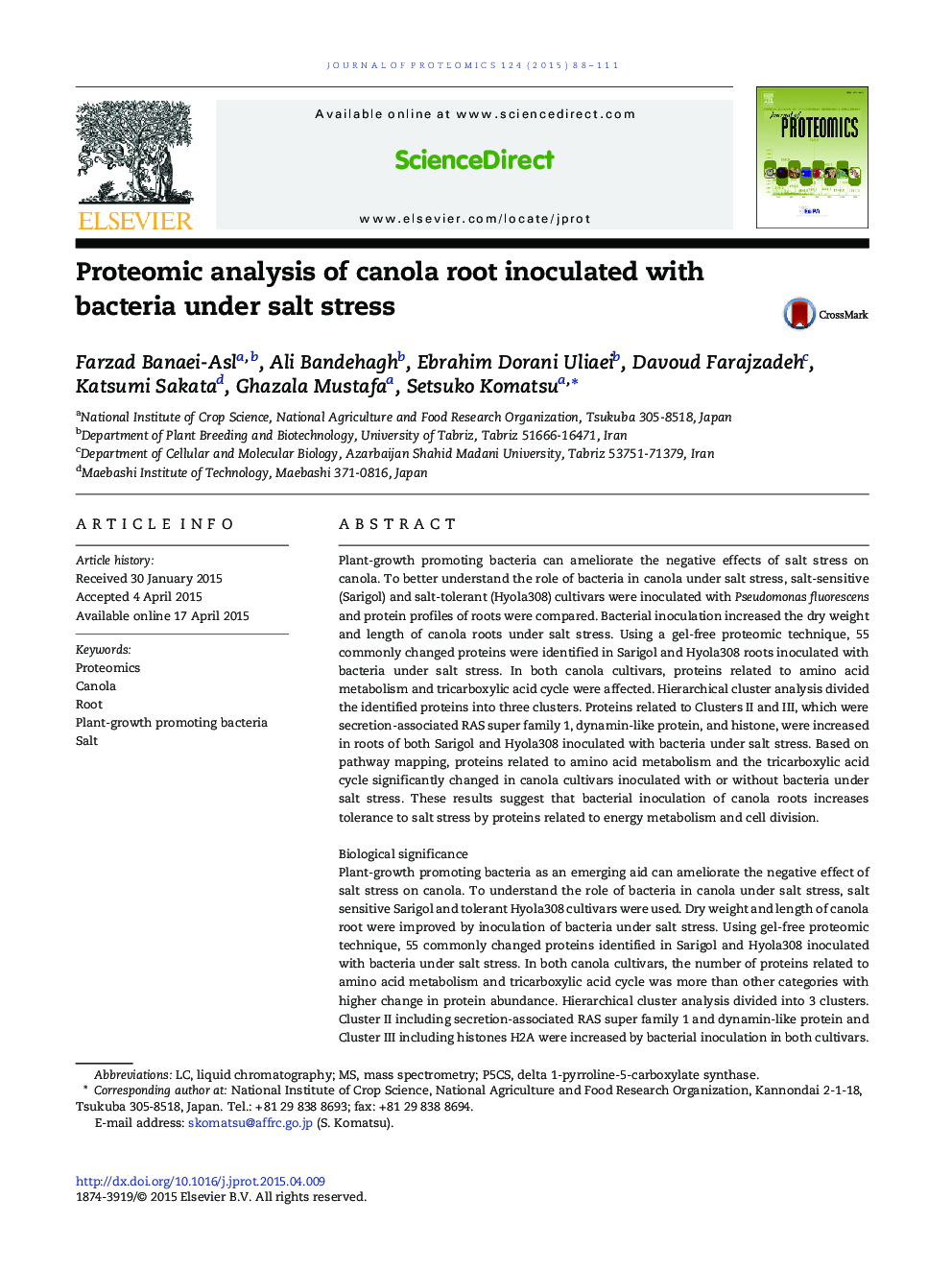| کد مقاله | کد نشریه | سال انتشار | مقاله انگلیسی | نسخه تمام متن |
|---|---|---|---|---|
| 1225990 | 1494756 | 2015 | 24 صفحه PDF | دانلود رایگان |
• Dry weight/length of canola root were improved by inoculation of bacteria under salt stress.
• Sarigol and Hyola308 were assigned as salt-sensitive and salt-tolerant cultivars, respectively.
• Proteins related to amino acid metabolism and TCA cycle altered in canola inoculated with bacteria under salt.
• Dynamin protein and histone were increased in canola cultivars inoculated with bacteria under salt.
• SAM synthetase and malate dehydrogenase were decreased in canola cultivars inoculated with bacteria under salt.
Plant-growth promoting bacteria can ameliorate the negative effects of salt stress on canola. To better understand the role of bacteria in canola under salt stress, salt-sensitive (Sarigol) and salt-tolerant (Hyola308) cultivars were inoculated with Pseudomonas fluorescens and protein profiles of roots were compared. Bacterial inoculation increased the dry weight and length of canola roots under salt stress. Using a gel-free proteomic technique, 55 commonly changed proteins were identified in Sarigol and Hyola308 roots inoculated with bacteria under salt stress. In both canola cultivars, proteins related to amino acid metabolism and tricarboxylic acid cycle were affected. Hierarchical cluster analysis divided the identified proteins into three clusters. Proteins related to Clusters II and III, which were secretion-associated RAS super family 1, dynamin-like protein, and histone, were increased in roots of both Sarigol and Hyola308 inoculated with bacteria under salt stress. Based on pathway mapping, proteins related to amino acid metabolism and the tricarboxylic acid cycle significantly changed in canola cultivars inoculated with or without bacteria under salt stress. These results suggest that bacterial inoculation of canola roots increases tolerance to salt stress by proteins related to energy metabolism and cell division.Biological significancePlant-growth promoting bacteria as an emerging aid can ameliorate the negative effect of salt stress on canola. To understand the role of bacteria in canola under salt stress, salt sensitive Sarigol and tolerant Hyola308 cultivars were used. Dry weight and length of canola root were improved by inoculation of bacteria under salt stress. Using gel-free proteomic technique, 55 commonly changed proteins identified in Sarigol and Hyola308 inoculated with bacteria under salt stress. In both canola cultivars, the number of proteins related to amino acid metabolism and tricarboxylic acid cycle was more than other categories with higher change in protein abundance. Hierarchical cluster analysis divided into 3 clusters. Cluster II including secretion-associated RAS super family 1 and dynamin-like protein and Cluster III including histones H2A were increased by bacterial inoculation in both cultivars. Furthermore, pathway mapping highlighted the importance of S-denosylmethionine synthetase and malate dehydrogenase that decreased in canola inoculated with bacteria under salt stress. These results suggest that bacterial inoculation helps the canola to endure salt stress by modulating the proteins related to energy metabolism and cell division.
Figure optionsDownload high-quality image (76 K)Download as PowerPoint slide
Journal: Journal of Proteomics - Volume 124, 21 June 2015, Pages 88–111
